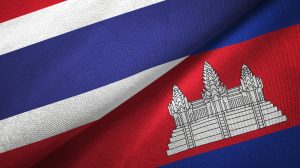Cambodia and Thailand will go to polls over the coming months. Governments in both countries have been widely criticized in recent years for human rights abuses and grinding down democratic values, particularly by the West.
It’s a narrative that’s been well-documented. Thais have spent half of the last decade under military rule, while Cambodians have endured a political crackdown that has dominated the headlines in both the government media and what remains of the independent press.
But the two countries have very different elections shaping up.
In Thailand, opinion polls consistently show that Paetongtarn Shinawatra, daughter of former Thai premier Thaksin Shinawatra, has widened her lead over Prime Minister Prayut Chan-o-cha.
Her Pheu Thai Party consistently grabs about 38 percent support while Prayut – who seized power in a 2014 military coup – has support from just 15.7 percent of respondents and is running third.
The fact that Thailand has opinion polls and that Prayut, a retired general, appears accepting of the results, offers some hope that Thailand will return to some type of democratic normality once the May 14 ballot is done and dusted.
In Cambodia, there are no opinion polls, although the next election results are as inevitable as they are predictable. Only the Cambodian People’s Party (CPP) can win given a relentless crackdown on opposition politicians through the courts, which predates the last election in 2018.
Independent media, human rights groups, lawyers and academics have, to varying degrees, fallen foul of government opinion and barely a day passes without the advice of senior leaders proffering on about how to behave through an omnipresent state media apparatus.
To resist is to risk litigation. And in Cambodia prosecutors have a remarkable success rate.
The CPP won all 125 seats in the National Assembly at elections in 2018 following the court-ordered dissolution of the Cambodian National Rescue Party (CNRP), which had gone tantalizingly close to winning half the popular vote at commune elections 2017 and the national ballot in 2013.
Since then, the Candlelight Party has emerged as the only opposition capable of winning any seats in the upcoming election. Formed out of the remnants of the CNRP, the Candlelight Party won just 22 percent of the overall vote at last year’s commune elections.
It cannot be regarded as an electoral threat. Nevertheless, the CPP holds great expectations for the July 23 poll, as detailed by Ben Sokhean of the Khmer Times.
He recently wrote that the CPP had predicted it could win up to 104 seats, or 83.2 percent, of the National Assembly seats which was based on its own analysis following the commune polls held in June last year.
That analysis, he reported, forecast the Candlelight Party was expected to win just 21 seats or 16.8 percent of seats to be contested. However, those ambitions have since changed.
According to Sokhean, “the CPP has made known its goal” to win up to 115 National Assembly seats or 92 percent of the total, forecasting that the Candlelight Party will get less than 10 percent.
That will put Hun Sen in the box seat as he continues to push for a generational change at the top where the children of ruling elites are expected to take over the ministerial portfolios of their fathers, and Hun Manet, Hun Sen’s eldest son, will be elevated to the prime ministership.
Any form of political opposition in the Cambodian parliament should be welcomed. But if those results pan out, this country is unlikely to lose its unwanted tag as a “one-party state.”
Cambodia’s political system is another galaxy when compared with Thailand. It is perhaps more comparable with communist Vietnam and Laos – given their historical affiliations during the war years – despite CPP insistence that Cambodia is a beacon of democratic pluralism.
But even Vietnam has 14 seats in its National Assembly reserved for non-communist party members and Laos has six seats reserved for independents.
That’s more than can be said for the make-up of Cambodia’s National Assembly over the last five years. And that’s unlikely to change, much, come July 23.

































